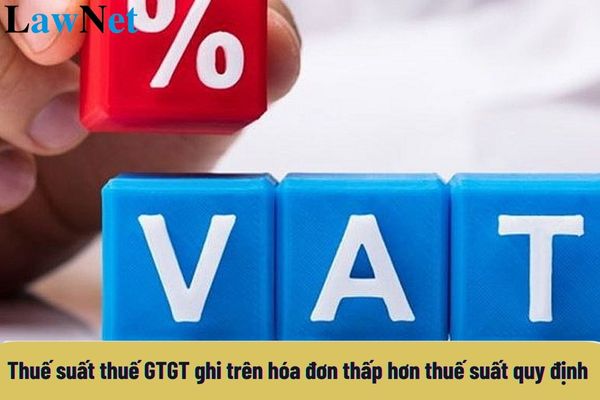If the VAT rate stated on the invoice is lower than the prescribed rate, at which rate should VAT be declared and paid in Vietnam?
If the VAT rate stated on the invoice is lower than the prescribed rate, at which rate should VAT be declared and paid in Vietnam?
Pursuant to point b, clause 5, Article 12 of Circular 219/2013/TT-BTC regulating the method of deduction of value-added tax as follows:
Method of Tax Deduction
...
5. Determining VAT payable:
...
a) Output VAT is the total VAT of goods and services sold, recorded on the value-added tax invoice.
...
Business establishments must comply with accounting, bookkeeping, invoicing, and documentation policies as prescribed by law on accounting, invoicing, and documentation. In cases where the invoice incorrectly states the VAT rate and the business establishment has not yet self-adjusted, and the tax authority checks and discovers, the handling is as follows:
For business establishments selling goods and services: If the VAT rate stated on the invoice is higher than the rate prescribed in the legal documents on VAT, the VAT must be declared and paid according to the rate stated on the invoice; If the VAT rate stated on the invoice is lower than the rate prescribed in the legal documents on VAT, the VAT must be declared and paid according to the VAT rate prescribed in the legal documents on VAT.
...
If the VAT rate stated on the invoice is lower than the rate prescribed in the legal documents on VAT, the VAT must be declared and paid according to the VAT rate prescribed in the legal documents on VAT.

If the VAT rate stated on the invoice is lower than the prescribed rate, at which rate should VAT be declared and paid in Vietnam? (Image from the Internet)
Where is VAT to be submitted?
According to the regulations in Article 20 of Circular 219/2013/TT-BTC regarding the location for submitting value-added tax (VAT) is as follows:
- Taxpayers declare and pay VAT at the localities where they manufacture, operate, or conduct business.
- Taxpayers who declare and pay VAT under the deduction method and have dependent production facilities located in provinces or centrally-run cities different from where the headquarters are located must submit VAT at the locality where the production facility is located and at the locality where the headquarters are located.
- In cases where enterprises or cooperatives apply the direct method and have production facilities in a province/city different from where the headquarters is situated or have mobile sales activities outside their province, the enterprise or cooperative must declare and pay VAT, as a percentage of revenue for revenue generated outside their province, at the locality where the production facility is located or where mobile sales take place. Enterprises or cooperatives do not have to pay VAT as a percentage of revenue at the headquarters for revenue generated outside the province that has already been declared and paid.
- In cases where a telecommunications service business establishment operates postpaid telecommunications services in provinces or centrally-run cities different from where the headquarters is based and establishes dependent entities that account for operations and pay VAT using the deduction method, and participate in providing postpaid telecommunications services in that locality, the telecommunications service business shall declare and pay VAT on postpaid telecommunications services as follows:
+ Declare VAT on the total revenue from postpaid telecommunications services of the entire business establishment with the tax authority managing the headquarters.
+ Pay VAT at the locality where the headquarters is based and at the locality where the dependent entity is located.
The VAT payable at the locality where the dependent entity is located is determined at a rate of 2% (for postpaid telecommunications services subject to 10% VAT) on revenue (excluding VAT) from postpaid telecommunications services at that locality.
- The declaration, payment of VAT is carried out in accordance with the regulations in the Law on Tax Administration and the guiding documents for implementing the Law on Tax Administration.
What are regulations on method of VAT deduction in Vietnam?
Pursuant to clause 1, Article 10 of the Law on Value Added Tax 2008, as amended by clause 4, Article 1 of the Amended Law on Value Added Tax 2013, regulations on the method of tax deduction are as follows:
- The VAT payable under the deduction method is the output VAT minus the deductible input VAT;
- Output VAT is equal to the total VAT of goods and services sold recorded on the value-added invoice.
The VAT of goods and services sold recorded on the value-added invoice equals the taxable value of the goods and services sold multiplied by the VAT rate of those goods and services.
In cases where the documentation records the payment price as including VAT, the output VAT is determined by the payment price minus the taxable value of VAT determined as per point k clause 1 Article 7 of the Law on Value Added Tax 2008.
- Deductible input VAT is the total amount of VAT recorded on the value-added invoice for purchased goods and services, tax payment documents for imported goods, and meeting the conditions specified in Article 12 of the Law on Value Added Tax 2008.

